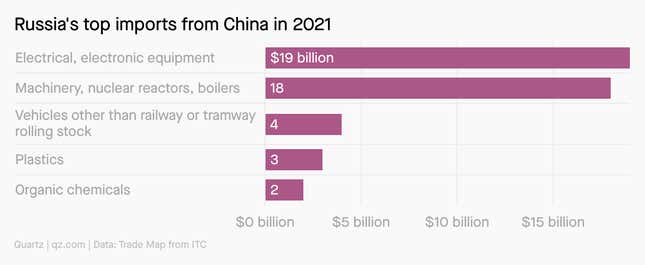Good morning, Quartz readers!
Was this newsletter forwarded to you? Sign up here. Forward to the friend with the most side hustles.
Here’s what you need to know
Oil prices fell. Brent crude briefly fell below $100 a barrel, a week after reaching a 14-year high of $130 on March 6, easing fears of an energy-driven recession and chronically high gasoline prices.
Talks between Russia and Ukraine continue. Meanwhile, as Russian forces reach Kyiv, the leaders of Poland, the Czech Republic, and Slovakia are also in Ukraine’s capital on an EU mission.
More major companies suspended operations over China’s lockdowns. Toyota, Volkswagen, and Foxconn are among those affected by severe restrictions in Jilin province and the city of Shenzhen.
Arm Holdings is shedding 15% of its workforce. The layoffs were announced just weeks after the collapse of the company’s $40 billion sale to Nvidia.
Nickel trading resumes tomorrow. The London Metal Exchange is imposing caps on price moves after a surge led to the suspension of the market for six trading sessions.
Amazon’s battle with Reliance in India moved to newspaper ads. The US firm used India’s leading national dailies to accuse Reliance and the Future Group of fraud.
What to watch for
The US Federal Reserve will raise the federal funds rate by 0.25% on Wednesday, eventually making consumer loans more expensive over time as Fed officials try to slow down inflation without creating a recession. The Fed will also release the Summary of Economic Projections, revealing inflation, GDP, unemployment rate, and interest rate forecasts for the year.
Here’s what to keep in mind:
3: Number of rate hikes officials had projected for 2022 (economists expect this forecast to go up)
5.2%: January annual US inflation rate excluding food and energy from the personal consumption expenditure report—the Fed’s preferred inflation measure
2%: Fed’s target for inflation (averaged over three to five years)
10: Years inflation has been running below the Fed’s target prior to the pandemic
What Russia buys from China
As the US and European countries beef up sanctions, China’s exports to Russia, its top trade partner, are surging.
China’s “neutral” stance toward Russia’s war on Ukraine is fortunate for both countries as China sends Russia electrical equipment, machinery, and vehicles, while Russia supplies China with petroleum products and wood.
Despite warnings that a pro-Russia stance will not benefit China in the long term, the partnership could give Chinese car manufacturers “the chance of the century,” according to automobile analysts.

Africa’s AI horizon

Africa is rife with opportunities for artificial intelligence. In Ethiopia, iCog—a company best known for contributing to the creation of humanoid robot Sophia—wants to find new ways to replicate human and animal cognition. But Ethiopia’s tech ecosystem isn’t flush with cash, and startups in niche industries like AI have it doubly difficult.
That’s not stopping startups from pushing ahead. Read about iCog’s foray into Africa’s AI industry in a free edition of the Quartz Africa Member Brief. Like what you see? You can get the brief in your inbox, plus unlimited access to Quartz Africa stories, by signing up for a membership today.
Handpicked Quartz
😐 When America’s investor visa is back, it will cost $300,000 more
🌾 The Russia-Ukraine war threatens Africa’s wheat supply
💻 Are Indian companies ready to allow employees a side hustle?
😷 China’s lockdown of its tech hub is bad news for the Fed’s fight against inflation
💰 Elon Musk hints Teslas could become more expensive
🙅♀️ The response to Ukraine will change the way companies react to conflicts
Surprising discoveries
Ever hear of a Hill’s horseshoe bat? Conservationists thought the peculiar mammal was extinct until they found one in Rwanda’s Nyungwe forest.
Pack-hunting spiders, oh my. They live in squads of up to 1,000, and hunt with webs that span several meters.
Covid-19 rules may have stopped the spread of dengue. The mosquito-borne virus was slowed by restrictions on people’s movements.
Geomagnetic storms are coming. Don’t worry, though—solar storms are common for Earth, and it means we could see more of aurora borealis and aurora australis.
The “D” in DJ might as well stand for “disco.” They’d be out of a job if it weren’t for a musical genre it became cool to hate. Hear how disco affected music as we know it in the latest episode of the Quartz Obsession podcast.
🕺 Listen on: Apple Podcasts | Spotify | Google | Stitcher
Our best wishes for a productive day. Send any news, comments, spider pals, and cornhole bats to hi@qz.com. Get the most out of Quartz by downloading our iOS app and becoming a member. Today’s Daily Brief was brought to you by Hasit Shah, Jane Li, Alexander Onukwue, Nate DiCamillo, Susan Howson, and Morgan Haefner.
